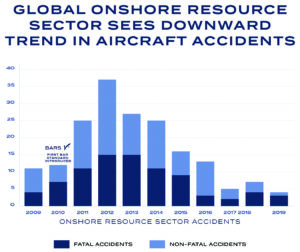The Flight Safety Foundation said its Basic Aviation Risk Standard (BARS) program is improving safety in North America and across the globe, with a decrease in aviation accidents in onshore resource industries such as mining since 2012.
According to BARS Managing Director David Anderson, the reduced aviation accidents directly correlate to the growth of the BARS program. “The Flight Safety Foundation developed the first Basic Aviation Risk Standard in collaboration with 12 Australian and American resource and mining companies to provide a more efficient means of monitoring, assessing and analyzing safety risks associated with contracted aircraft operators,” Anderson said.
“Evidence shows that the number of contract aircraft accidents increases when activity in the mining sector surges. With mining activity increasing around Canada’s Northwest Territories, proper risk management will be even more important in maintaining this downward trend in contract aviation accidents.”
As one of only three globally recognized standards, BARS Member Organization’s (BMO) incident and audit data is aggregated to identify gaps in contract aviation risk management to improve safety standards for the entire industry.

Glencore, a longtime BMO participant, operates in 50 countries and its Director of Aviation Dean Carroll said aviation challenges differ greatly between locations. “We operate in various hostile and remote locations with extreme weather conditions and a large workforce to transport,” Carroll said. “Our staff are the heart of our operations, so being confident in their safety prior to flights taking-off is of utmost importance. This is especially true for our Raglan mine operations where we employ more than 950 workers who fly in and out of a particularly harsh environment.”
According to Carroll, the company spent significant resources on ineffective and inefficient audits prior to becoming a BARS member. “As a BARS member, we apply a single standard across all our operations, and feel assured our contracted flights are with a global network of aircraft operators committed to and proven in flight safety and are actively evolving with industry best practice.”
According to the Flight Safety Foundation, the BARS Program has evolved amid border lockdowns to assess the safety of aircraft operators remotely.
“Without the BARS Program, and now our remote monitoring audit solution, companies in a range of different sectors would need to wait months in the current climate for an auditor to be able to physically travel to conduct an assessment of an aircraft operator,” Anderson said. “BARS is continuing to offer businesses and governments that rely on contract aircraft peace of mind by ensuring safety standards are maintained at a time when many organizations are facing uncertainty and widespread restrictions.”
With the initial success of the remote monitoring audits and international travel unlikely to resume before July 2021, BARS has extended its remote auditing program to December 2020.









